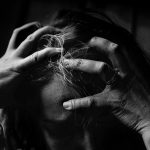What is Pseudodysphagia?
Patients with Pseudodysphagia complaint about the inability to swallow but they do not have any physical symptoms to account for their condition. The word Pseudodysphagia comes from GreekPhagophobia where “phagein” means eating and “phobos” means deep dread, aversion or fear. Other names for this phobia include sitophobiawhere sito is Greek for food.
Pseudodysphagia is an unnatural and irrational fear of choking or swallowing that causes a person to believe s/he will become ill or die if one tries to eat solid foods. The nature of difficulty these patients face when it comes to swallowing varies depending on the level of their fear: some people can only eat very small pieces of well lubricated foods, while others are afraid of drinking liquids or swallowing pills or tablets. Naturally, there is substantial loss of weight in this phobia and it is a debilitating condition that can interfere with one’s day-to-day life.
What are the causes of fear of choking phobia?
As with most specific phobias, Pseudodysphagia also begins with a negative experience related to swallowing food. As a child, the phobic might have choked, vomited or had an “embarrassing response” after swallowing certain types of foods. The brain then creates the same response as a defensive mechanism each time one is confronted with the thought of eating. For example, a patient recalls choking (as a child) on a quarter after it got lodged in his throat. He lost consciousness and turned blue and recalls fearing eating solid foods like steaks, meats, capsules, pills (anything hard or chewy) after the incident.
Psychiatrists also believe that most people with the extreme fear of choking are usually anxious or suffering from other psychiatric disorders like depression, Hypochondriasis, Agoraphobia or have a general predisposition to panic attacks.
The fear of choking is also often listed in conjunction with Globus sensation-(a condition that comes and goes wherein the patient feels there is a lump in his throat that prevents him from eating). However, the two conditions are different; Globus sensation is more common and occurs when patients are typically suffering from ear-nose-throat infections that cause them to fear they might choke or vomit after eating.
 Symptoms of Pseudodysphagia
Symptoms of Pseudodysphagia
Psychogenic Dysphagia leads to many psychological symptoms, the most important one being inefficient ordisorganized swallowing. Other symptoms of the fear of choking include:
- Avoidance of food, especially swallowing pills, tablets, hard and chewy foods
- Abnormal oral behavior is also seen including deviant tongue movements, feeling the throat pressure, and complaint of globus sensation.
- Malnutrition and weight loss are common side effects of this phobia
- General difficulties in breathing, swallowing and other issues like elevated heart rate, feeling dizzy, having fearful thoughts of dying, passing out or embarrassing oneself in front of others are common symptoms of Pseudodysphagia.
- Nightmares about choking on candy, peanuts or indelible objects also tend to keep these patients awake at night.
- Some refuse to eat in front of others thinking that swallowing makes “unpleasant noises”.
Needless to say, this phobia is a debilitating condition that affects the normal life of the patients.
Source: http://www.fearof.net/fear-of-choking-phobia-pseudodysphagia/
Lets hear from Maddie:






